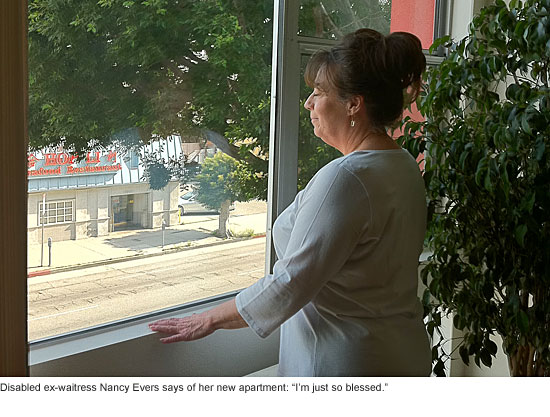Top Story: Social Services
Board reasserts control over agencies
May 17, 2011
 The Board of Supervisors today formally placed two of the county’s most troubled agencies—the Probation Department and the Department of Children and Family Services—under its direct control, rebuffing a last-minute motion that called the move “impulsive” and even potentially dangerous.
The Board of Supervisors today formally placed two of the county’s most troubled agencies—the Probation Department and the Department of Children and Family Services—under its direct control, rebuffing a last-minute motion that called the move “impulsive” and even potentially dangerous.
The motion by Supervisor Don Knabe, which sought a 45-day delay in adopting the new structure, was seconded by Supervisor Mark Ridley-Thomas but failed to win approval by the board majority.
Supervisors Michael D. Antonovich, Gloria Molina and Zev Yaroslavsky approved the ordinance permitting the board to retake authority for managing the departments. The ordinance was tentatively approved on its first reading last week.
With the two departments no longer under supervision of the county’s Chief Executive Office, supervisors believe they will be able to obtain more timely and direct information from the departments, both of which have been plagued with embarrassing and sometimes tragic miscues.
In the case of DCFS, a series of children’s deaths has raised widespread concerns about the department’s operations and management. The agency’s director, Trish Ploehn, was reassigned to the Chief Executive Office last December and an interim replacement, Antonia Jimenez, resigned last month and returned to her former CEO post. Under the new governance structure, selecting someone to head the department now becomes a top priority for the Board of Supervisors.
As for probation, a new team led by former Alameda County probation chief Donald Blevins is working to fix problems ranging from employees’ sexual misconduct to lax management practices to poor educational outcomes for young people under its supervision. Going forward, supervisors will need to make sure those efforts stay on track and will also be at the forefront of ensuring that the department complies with a series of Department of Justice-mandated reforms.
The move to reassert control over both departments comes as supervisors consider making changes to the county’s overall governance structure. A report by Chief Executive Officer William T Fujioka and the supervisors’ chief deputies is expected to come before the board next week.
Posted 5/17/11
Board to oversee troubled agencies
May 10, 2011
 In a move months in the making, a frustrated and divided Board of Supervisors voted to retake direct authority over the operations of two chronically troubled departments managed by the county’s chief executive officer.
In a move months in the making, a frustrated and divided Board of Supervisors voted to retake direct authority over the operations of two chronically troubled departments managed by the county’s chief executive officer.
Voting 3-2, the board majority on Tuesday took the first step in removing the Department of Children and Family Services and the Probation Department from the CEO’s portfolio. In the process, the supervisors erased any doubt about their willingness to modify a governance structure they created in 2007 to reduce their day-to-day management of the county’s vast bureaucracy of departments.
Voting in favor of the new structure were Supervisors Zev Yaroslavsky, Michael D. Antonovich and Gloria Molina. Opposing it were Supervisors Mark Ridley-Thomas and Don Knabe.
Because the board’s action requires a change to a county ordinance, a second vote is required next week to add children’s services and probation to several other departments that were exempted from CEO oversight and report directly to the supervisors.
For months, board members had been growing increasingly concerned and vocal about worsening problems within DCFS and probation.
The tragic deaths of a number of youngsters had ignited an uproar over issues of competency and oversight of DCFS at all levels. Last December, the agency’s embattled director, Trish Ploehn, was removed and reassigned by the CEO’s office, headed by William T Fujioka.
The Probation Department, meanwhile, was grappling with everything from sexual misconduct of employees to an inability to track nearly $80 million allocated by the supervisors to hire personnel. An internal review revealed, among other things, that management was so loose that too many employees had been hired for the department’s youth camps—a problem now being corrected by a new management team led by former Alameda County probation chief Donald Blevins.
In the case of both departments, some board members came to believe they were not being provided information necessary to understand the serious and recurring lapses for which they—as the county’s top executives—were being held accountable.
The turning point came last month when DCFS’s interim director, Antonia Jimenez, openly defied a motion by the supervisors to sign a “memorandum of understanding” with the board’s special counsel for investigating child deaths and offering possible policy reforms.
The document, signed by the top officials of eight other county departments, established protocols to ensure that the Children’s Special Investigations Unit was able to independently and efficiently review child deaths and serious cases of abuse and neglect of children under the care and/or supervision of the county.
The document also stated that the unit’s reports, prepared solely for the board, were deemed attorney/client privilege to maintain their confidentiality and thus could not be given to the departments—a provision Jimenez found unacceptable, even though she’d be allowed to read them and be given copies of any recommendations. (While earlier overseeing DCFS in the CEO’s office, Jimenez had argued that she needed copies of the reports there, too.)
Jimenez’ intransigence led to an April appearance before the supervisors that left several of them clearly exasperated.
“The other departments didn’t have a problem signing the [memorandum of understanding]. You should sign the darn thing,” Yaroslavsky told Jimenez. “Why this had to get to this point and raised to this level is beyond me. It’s really a mountain out of a molehill.”
Molina agreed, saying: “It’s shameful that we have to go through this kind of a process for something that this board has found very, very helpful.”
The board concluded by passing a motion directing Jimenez to sign the document by 5 p.m. Instead, she resigned, returning to the CEO’s team to oversee children’s services from there—a move that Antonovich later called “a blatant act of insubordination.”
Three weeks later, Yaroslavsky, Molina and Antonovich would form the three-vote majority needed to reassume authority over DCFS and probation.
“These are the two most troubled departments in the county today, and the board majority wants a more direct role in overseeing them,” Yaroslavsky said after the meeting. “The CEO will continue to partner with us, but the board will be primarily responsible.”
Ridley-Thomas, who joined with Knabe in voting against the measure, was visibly angry when his effort to have the vote delayed was rebuffed. When asked how he wanted to vote, he shouted “No!” and then added just as loudly: “Ridiculous.”
Ridley-Thomas argued that he needed more time to study a Yaroslavsky amendment to the ordinance aimed at ensuring that the new management structure would not impede the internal sharing of confidential information among departments.
Ridley-Thomas called the reluctance of the board majority to reschedule the vote “a rush to judgment” and urged his colleagues to side with him as “a point of courtesy to allow everybody to come up to speed.”
But Yaroslavsky and County Counsel Andrea Ordin both noted that the amendment had been suggested by Ordin as one of two options in a memo she sent to the supervisors last week.
Antonovich, meanwhile, noted that Tuesday’s vote was just the first of two, suggesting to Ridley-Thomas that if his concerns weren’t addressed this week’s meeting, then he’d have a chance to address them before next week’s vote.
Posted 5/10/11
From eyesore to godsend
April 14, 2011
 When Menorah Housing Foundation cut the ribbon this week on its bright new West Los Angeles senior housing project, Terri Tippit was thrilled.
When Menorah Housing Foundation cut the ribbon this week on its bright new West Los Angeles senior housing project, Terri Tippit was thrilled.
“That corner,” she says, “has been an eyesore for as long as I’ve lived here. And I’ve lived here for 37 years.”
Although the $10.9 million complex has been open for two months at Veteran Avenue and Pico Boulevard, this week marked its official grand opening. Restricted to tenants 62 and over with a maximum income of $29,000 for one-person households and $33,150 for couples, it brings 45 units of desperately needed low-income senior housing to one of the city’s priciest neighborhoods.
“We received 1,134 applications,” says foundation president Anne Friedrich, whose organization—a non-profit, non-sectarian offshoot of the Jewish Federation of Greater Los Angeles—operates 17 apartment buildings for low-income seniors throughout the county. “We held a public lottery.”
During the 1970s and 1980s, the building housed the Department of Public Social Services West Los Angeles Regional Office—a drab, beige, 37,597-square-foot welfare facility in an area of homes and apartments. All day, Tippit says, needy people would line up outside, waiting for caseworkers. Periodically, the office would reach capacity and close its doors, and the crowds would mill around the neighborhood, waiting for the building to reopen.
“It was all right at first, when it was mostly women and children,” says Tippit, who chairs the Westside Neighborhood Council and serves as president of the West of Westwood Homeowners Association. “But then it switched to more of a general relief, homeless population. There was a liquor store directly across the street—with a signal, yet—and, well, I won’t go into the gory details, but there were a lot of problems with the clients. They weren’t respectful of the community.”
Sympathetic though she was, she says, she and others pushed hard for the welfare offices to be moved to a more commercial sector. But when the move finally occurred, the now-vacant building presented new problems. Unoccupied for years, it became a magnet for weeds, graffiti and vagrants. “It wasn’t kept up,” she says. “You can’t have people sleeping in doorways.”
Finally, in 2009—and with city, county and federal assistance—Menorah Housing Foundation bought the property from Los Angeles County, razed the old offices and started construction on the new apartments. It wasn’t easy, says Lance Bocarsly, who chairs the foundation’s board. Because property values in Los Angeles are so high, low-income housing projects can be prohibitively expensive.
“Supervisor Yaroslavsky was absolutely instrumental in letting us pull this together,” says Bocarsly. “This would not have happened without him. He was the engine.” Which is why, he added, the new complex has been named the Zev Yaroslavsky Apartments.
Tippit says the neighbors are so happy that they’ve decided to be patient—for now—with an unexpected parking issue caused by the number of cars at the complex.
“Now that there’s a new building,” she says, “it’s a whole new environment.”
For the residents, the place is nothing less than a godsend. Clean and secure, with a bus stop out front, a diner next door and a shopping center a half-block walk away on a level sidewalk, the apartments rent on a sliding scale that averages about $240 a month. Friedrich says the average tenant is 71 and the average income is far below the eligibility requirement.
“I moved in here on my birthday, February 15, and it was the best present I’ve ever had in my life,” says 63-year-old Nancy Evers, a disabled ex-waitress who had been paying $785 a month for a room over a garage in Montrose when she heard she had won the right to lease her third-floor unit.
Evers said she had been trying for years to get into subsidized housing, only to be confronted with years-long waiting lists.
“I’m disabled and only get Social Security,” Evers says. “My rent only left me $50 a month to live on. I was living on bread. French toast, bread and butter, bread and bread. My doctor kept saying, ‘Nancy, what are you eating?’ But my daughter heard about Menorah Housing and said, ‘I think if you call, God is telling me it’ll be all right for you this time.’”
Evers was reluctant to get her hopes up.
“I’ve been working since the age of 13, when I got my first job peeling potatoes at a greasy spoon at Sixth and Bixel,” she says. “I never win anything. But I called and I got it. Now I have a one-bedroom apartment, and it’s so bright and sunny—full-sized fridge and stove, beautiful butter-yellow bedroom carpet. You could probably get four people in my shower. I’m just so blessed, and I think everyone in here feels the same way.”












 405 bridge work causes a stink
405 bridge work causes a stink

